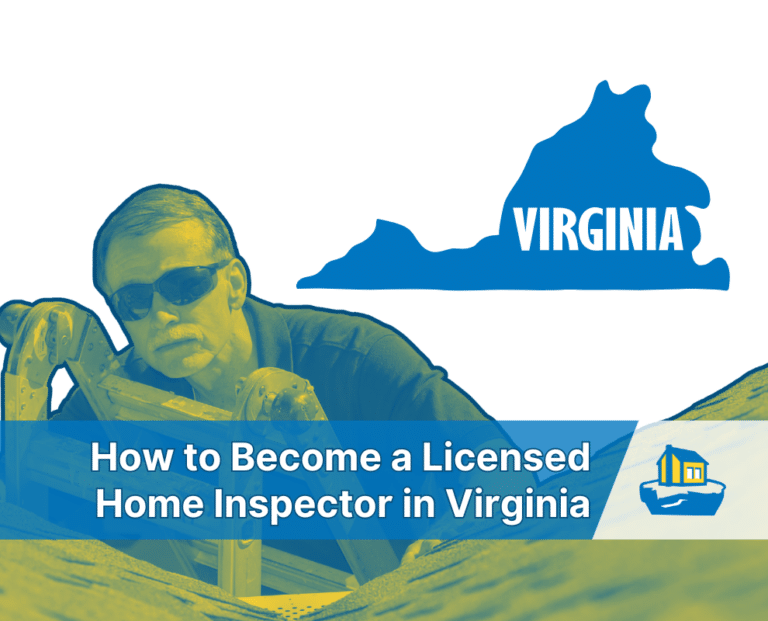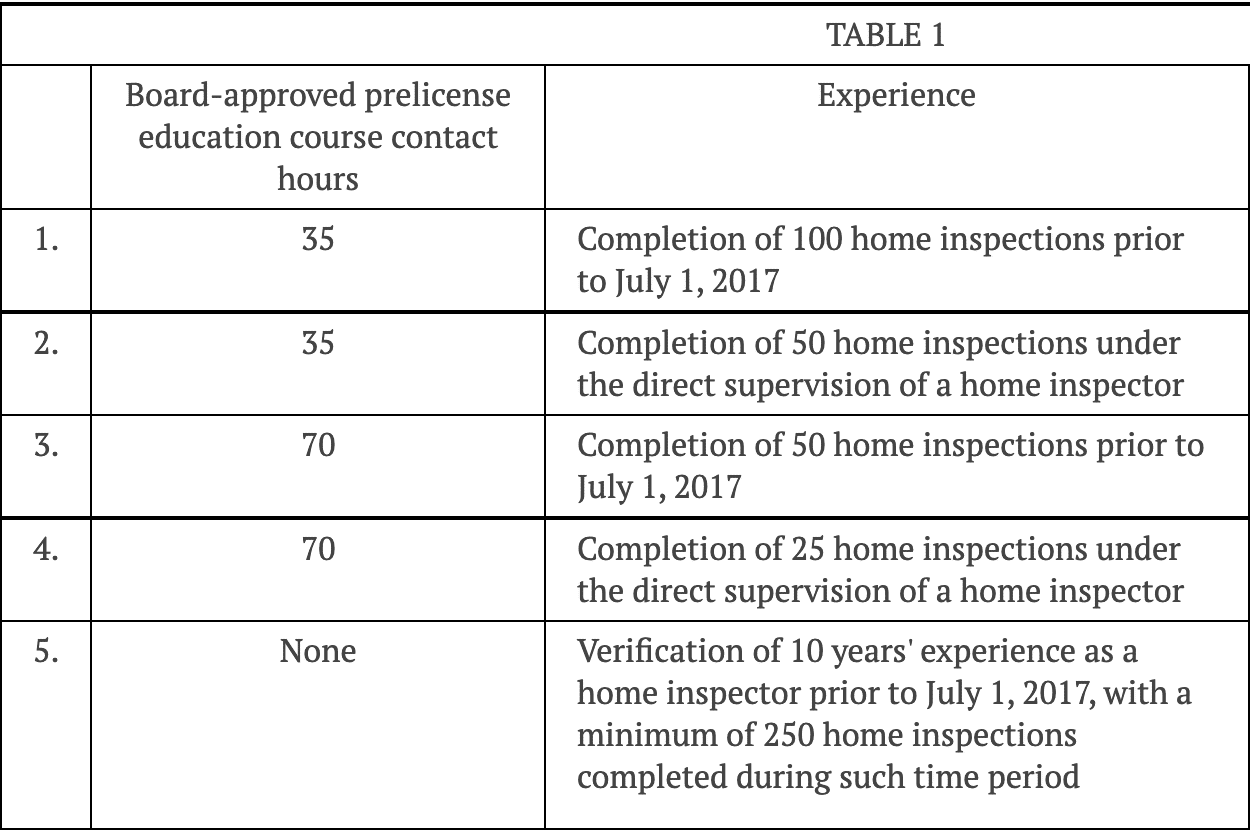4.9 1890+ Google Reviews

Inspections have been calling you and you're wondering how to become a home inspector in Virginia. Well, you have to come to the right place. I have created the ultimate guide from start to finish.
When I first started my home inspection business in 2012, there were no state requirements to become an inspector. Anyone could legally inspect homes. There were various private home inspector certification programs, but they were not mandatory. It was the wild wild west here. That is actually how I like it, but governments like to control everything. Consequently, a home inspection license doesn't mean the license holder is any good at performing inspections. Nevertheless, effective July 1, 2017, anyone in Virginia performing home inspections needs to be licensed.
The first step is making sure this is the right career path for you. It is not the hard-hat-wearing, clip-board-holding job that social media may have led you to believe. You will have to walk on roofs, crawl in nasty moldy crawl spaces, and traverse hot, humid attics. Additionally, you'll deal with nervous home buyers and overbearing Real Estate Agents.
You will spend a fair amount of time outside during blistering hot temperatures, torrential downpours and freezing cold conditions. Although most of your work will be in the field and hands-on, you will have to spend some time with a laptop writing your reports. Your writing and grammar skills need to be top-notch. If you can deal with all of that, then let's get started on your new career.
Although not necessarily required to become a home inspector, I highly recommend getting InterNACHI certified. Moreover, you should do this before taking (and paying for) your classroom training. There are two reasons why I recommend doing this.
The first is that the online courses InterNACHI offers are far superior to any other training in the industry. These courses will give you a solid foundation before you do your in-person education classes. The course materials are online, so you will be able to do this at your own pace as opposed to the in-person courses. The second reason is that most courses in Virginia are 35 hours or 70 hours. This reflects the Virginia license requirements of either 35 or 70 hours of pre-licensing education.
Half of those hours can be done online, though. You should opt for the 35 hours in-person course, which will be much cheaper. The in-person classes aren't great anyway. As a new home inspector, the best home inspector training is field training.
You may find as you are going through the courses that you don't actually enjoy the idea of inspecting homes. Obviously, this can save you some money and time.
InterNACHI has many other benefits besides education. They have everything you need to become a home inspector.
During the pandemic, DPOR (Virginia Department of Professional and Occupational Regulation) was allowing all of your education to be done online. They even extended the expirations of license holders. That is ending soon, though, and at least half of your education will need to be in person.
I consider these home inspection courses to be legal requirements but not sufficient home inspection training. As noted above, you will need field training from an experienced home inspector. I recommend the following courses for in-person home inspector training courses.
KC Hart and Co Home Inspector DPOR Approved Pre-license Class - $
$899 (2025 Pricing)
ATI Live Home Inspector Training
$1400-$2100
American Home Inspectors Training (AHIT) -
$1400-$2100
In reality, neither 35 nor 70 hours of education is enough preparation for the job.
Now that you have the education requirements figured out, you need to complete the experience requirements to become a home inspector.
In VA, the licensing requirements are a little confusing. You need to perform inspections under a licensed inspector. The required amount is dependent on how many hours of education you received. The table below breaks it down. Also, a contact hour is usually 50 minutes.

Most people complete this step by calling local home inspection companies and begging for them to help. This can be very challenging as most inspection companies do not want to train their competition. One strategy is to call companies that are not local to you.
My advice is to join a company as an apprentice at this point. You will be able to start getting the real knowledge and experience that classroom education can not offer.
At some point, you will need to pass the National Home Inspectors Examination. This exam is straight garbage- a total waste of $225. It was written by people with little knowledge of the fundamentals of home inspection.
That being said, you need to pass it to become a home inspector. Some people are great test takers, and they will be able to pass it just from the education from InterNACHI and their in-classroom training.
That is the exception though, not the rule. As I said above, you really need to become an apprentice for a while to have your best shot at passing this exam. There are some companies that offer exam prep, but I have personally never used them.
In the state of Virginia, the only insurance you need to carry is general liability insurance. If you join an established home inspection business, they will simply add you to their insurance. If you are starting your own home inspection business, you will need to acquire this insurance yourself. I recommend getting your insurance through InterNACHI. I also recommend getting errors and omission insurance even though it is not required. This type of insurance essentially covers your defense costs if you get sued, and pays out any damages. The minimum amount of insurance required in Virginia is $250,000.
Once you complete your education, experience, exam, and insurance requirements, you can submit a completed application to DPOR. I have never submitted an application for any inspectors without them asking for additional information. There's always something. Patiently wait for DPOR to respond and usually in a week, or two, you will receive your individual home inspector license.
A few years ago, builders lobbied to limit home inspectors from being able to inspect their homes. Now, any residential home inspections performed on a home that is still owned by the builder, need to be completed by a home inspector with the NRS (New Residential Structure) credential. The NRS training module is essentially eight hours of someone telling you that you are not a code inspector, you can't cite virginia residential code, and you can't call anything a code violation. There is no actual new information being presented to you. I just told you the whole class. Its essentially a money grab, but it is what it is. I recommend these guys below.
As a professional inspector, you are going to need a software that helps you create a professional home inspection report. There are three big companies in that space.
Spectora
COMING SOON!
In order to keep your license you will need to complete 16 hours of continuing education. The following is copy and pasted from the DPOR website. Again, I recommend InterNACHI for all of your continuing education needs.

5 Mega Flaws with Your Home Inspector Marketing
Best Radon Monitor for Home Inspectors (2025)
Box Fill Calculations for Home Inspectors
Can Home Inspectors Turn on Breakers?
Can Home Inspectors Offer to Make Repairs?
The Best Thermal Camera For Home Inspectors (2025)
How to Become a Home Inspector in Virginia – Complete Guide
3 Home Inspection Marketing Tips to Double Business
Best Black Friday Deals For Home Inspectors (2022)